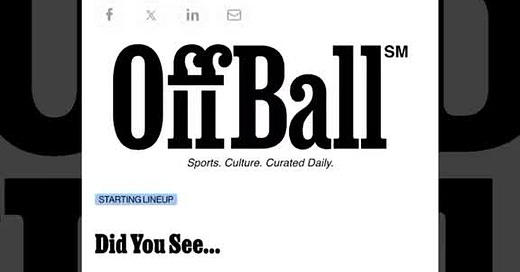The enshittification of the U.S. government continues apace — anyone for “kakistocracy” as the word of the year? — but for the time being I’m going to do my best to 1) stay in my lane and 2) uphold standards. Today I’m even going to accentuate the positive. Enjoy it now; it may never happen again.
Welcome back to Naming Briefs, an ongoing series in which I scrutinize and analyze brand names I’ve spotted in the wild or in my reading. This report is the eleventh in a series; here’s Naming Briefs #10, which includes links to previous installments. And here’s some background on the series. Drop a note in the comments if you’ve seen a name I should write about.
March Hare.
A watchmaker that specializes in women’s wristwatches is pretty uncommon, so cheers to founder/owner Mabel McLean, who launched MARCH HARE WATCHES with her sister in 2021. The “simple little watches” in the collection have slim leather bands and dials with slender Roman numerals; the “Harriet”1 has a round face, the “Kimsey” a square one. Prices range between $359 and $401.
I immediately understood and liked the name: an excellent example of a suggestive mark that’s rooted in literature and whimsy. But I was disappointed that the website’s About page says not a word about where the name comes from and why it’s a good fit. I’ll fill in the blanks.
The reference, I gather, is to the March hare character in Lewis Carroll’s Alice’s Adventures in Wonderland. Here’s the relevant passage:
The Hatter was the first to break the silence.
'What day of the month is it?' he said, turning to Alice: he had taken his watch out of his pocket, and was looking at it uneasily, shaking it every now and then, and holding it to his ear.
Alice considered a little, and then said 'The fourth.'
'Two days wrong!' sighed the hatter. 'I told you butter wouldn't suit the works!' he added, looking angrily at the March hare.
'It was the best butter,' the March hare meekly replied.
'Yes, but some crumbs must have got in as well,' the Hatter grumbled: 'you shouldn't have put it in with the bread-knife.'
The March hare took the watch and looked at it gloomily: then he dipped it into his cup of tea, and looked at it again: but he could think of nothing better to say than his first remark, 'It was the best butter, you know.'
Maybe March Hare Watches doesn’t want buyers to get any ideas about buttering the works or dipping watches in tea (although the March Hare models are advertised as water resistant). But the blend of “time” and “playfulness” — not to mention “classic literature” — is certainly appropriate here, and worth reminding customers about.
My March hare research took me to an online forum for a different (and much more expensive2) watch brand, Christopher Ward, where I discovered an elegant little essay about Lewis Carroll and time. Here’s how it concludes:
It is not surprising that Lewis Carroll plays with time in “Alice’s Adventures in Wonderland” as he certainly plays with relative size and proportion, as well as words and meanings. It might be wondered why he did not play with “time” more than he did, but then the basis of the book is based on the distinction between waking time and dreaming time, so we can see the whole book as a rift in time filled with a rich tapestry of magic and wondrous characters. Interestingly, Carroll’s take on the story - Alice’s dream - is permeated with a sense of uneasiness sometimes bordering on cruelty.
As far as the Hatter’s actual pocket watch is concerned, we have to compare his timepiece with timepieces that were generally available at the time Alice in Wonderland was written. The early and mid 1860’s represented the twilight of watches manufactured by individual watchmakers and small watchmaking concerns. Only ten years later, in about 1875, the watchmaking industry started to become more automated, with machine-production of components that were standardized such that they were interchangeable between identical models of watch and ebauche, so making economies of scale possible. At the time of “Alice,” the American industry had not yet conquered Europe and Britain with its new model of industrial production although the British watchmaking industry had already succumbed somewhat to Swiss competition. The notion of the very cheap so-called “dollar watch” had not yet been sprung upon the public and watches were still something of a luxury, though gradually filtering down into the middle classes, and when Lewis Carroll was writing Alice in Wonderland, the reality of a global watch industry was still some way off.
OffBall.
Another name I like! I’m just as shocked as you are.
Here’s how AirMail described OffBall shortly after the site launched in September:
At their peak, Sports Illustrated and Grantland were beacons of light in the world of sports journalism—but times changed, and they both fell out of fashion. That’s not to say that the field is dead—rather, it’s transformed. Sports news now pays attention to the action happening online, beyond the field. Aggregating never-ending streams of information about the athletics world is the central idea behind OffBall—a Web site and newsletter that celebrates sports culture by compiling the latest and most vital dispatches from venues such as Instagram, the Athletic, X, and, yes, even Sports Illustrated.
What are we meant to understand about the OFFBALL name? As with March Hare Watches, there’s no explanation on the site, so I’ll do some independent inferring. Please keep in mind that I don’t follow any spectator sports and have only a passing acquaintance with most sports jargon.
Offball does not appear in any of the standard or slang dictionaries I consulted.
Ball is a synecdoche for sports in general. Suggestive naming for the win once again.
The idiom on the ball means “savvy,” “alert,” “competent.” It’s derived from the sports idiom: to be on the ball is to be in control of it.
Off the ball is used in football, rugby, basketball, and some other sports to describe a player’s actions when not in possession of the ball. According to a Wikipedia entry, the expression is originally British, so —for my U.S. readers — “football” may mean “soccer.”
Offball suggests offbeat + oddball, “an eccentric or unconventional person” (1948, American English colloquial) or an adjective meaning “eccentric or unconventional” (1946, originally used by aviators).
Bottom line: The name is suggestive of sports, and in particular of sports observed from the sidelines (i.e., when not in possession of the ball; “beyond the field”). It’s also suggestive of “doing things in our own idiosyncratic manner.” It’s lightly coined and a tiny bit off-kilter yet completely intelligible. Also good: the URL, which uses the .news domain.3
Then there’s the little animated sportsfella. Adorable!
Thanks to
for bringing OffBall to my attention.The product copy for the Harriet refers to “her” slender silhouette. Yes, it’s another example of the she-ification of consumer goods and brands, which I wrote about back in May.
But not as expensive as the Chief Grifter’s gaudy grotesqueries.
OffBall.com is registered to an organization dedicated to advancing the sport of offball, invented in 1992 by an Italian physical education teacher. Played on a volleyball court, it’s “a team game with two different attacks: net attack and off attack to eliminate all opponents and win.”








OffBall immediately made me think of oddball as well, but in basketball there's also an "off-ball screen", where an offensive player blocks a defensive player so another offensive player can drive to the basket or take a shot (https://hoopstudent.com/basketball-off-ball-screen/). Since folks will be reading the content on a screen, that's an interesting wrinkle! :)
I try to learn something new every day—especially words—so I was delighted to find ébauche, which doubles for both an under painting and an incomplete watch movement.
Offball is indeed a well chosen moniker.